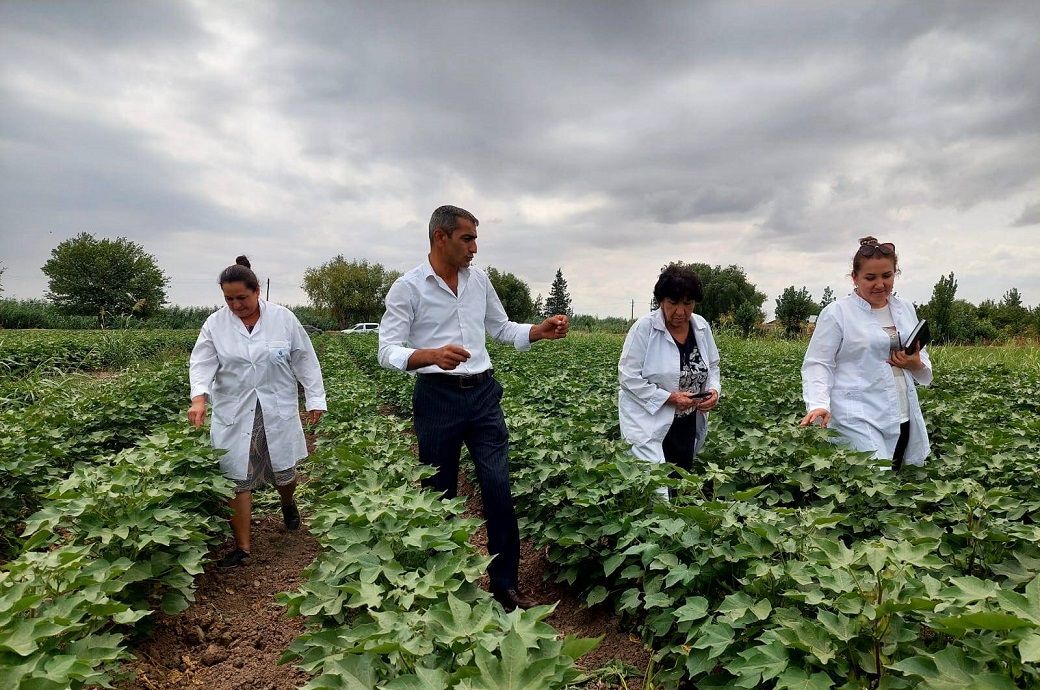
Implemented in 2021, the pilot, part of an IAEA technical cooperation project, focused on developing CSA guidelines for cotton production, training Azerbaijani researchers and progressive farmers in CSA practices and designing on-farm demonstration trials, according to the press release by the IAEA.
A further project, initiated in 2022 and focusing on strengthening best practices in soil, nutrient, and water management agricultural practices for cotton production, aims to help improve cotton productivity, as Azerbaijan’s land is particularly vulnerable to climate change and soil degradation. The country’s average annual temperature has risen by 0.4°C since 1991, with decreasing rainfall and more frequent extreme weather events, such as floods, droughts, or heat waves.
“Generally speaking, 60 per cent of improvement in crop productivity comes from capitalising on the strategic application of soil nutrients and water management,” said Mohammad Zaman, a soil scientist at the Joint FAO/IAEA Centre of Nuclear Techniques in Food and Agriculture and technical officer of the project. “It’s about the right amount, in the right way, at the right growth stage.”
CSA practices involve the use of isotopic techniques to obtain essential information on how to optimise fertiliser use and increase the efficiency of agricultural production while maintaining soil health.
“When we started, Azerbaijan’s soils were heavily degraded, the fertility was very poor, and so the soil did not have the capacity to provide all the essential nutrients required for the cotton growth,” Zaman said. To address this, IAEA experts developed a complete package of nuclear and related farming techniques: from preparing soil and selecting the best cotton varieties to applying nutrients and irrigation to cotton fields and ensuring weed, pest, and disease control.
“Applying improved soil, nutrient, and water management practices along with using the cotton super variety has led us to increase our cotton productivity, quality, and profit,” said Sakhavat Mammadov, a farmer from Azerbaijan who took part in the pilot project and has been using CSA practices on his farm for the last two years.
Nuclear and related techniques help not only in increasing agricultural productivity but also in building resilience of agriculture systems to climate change. In Azerbaijan, the researchers used a technique involving nitrogen-15 (N-15), a stable isotope. Nitrogen plays an important role in plant growth and photosynthesis—the process whereby plants convert carbon dioxide and sunlight into plant food. Zaman explained that a lack of nutrients in the soil, such as nitrogen, leads to low and less nutritious yields. Excessive or incorrect application of nitrogen fertilisers, on the other hand, contributes to emissions of greenhouse gases and pollution of surface and groundwater.
Azerbaijan has in the past been a leading producer and major exporter of cotton, harvesting more than 830,000 tonnes in the 1980s, which provided up to a quarter of the country’s income. However, the transition to a free market and the rapid growth of other industries in the 1990s contributed to cotton losing its key role in Azerbaijan's economy, with production falling to a record low of 31,000 tonnes in 2009. The project outcome shows the significant potential of climate-smart practices in increasing agricultural productivity.
“Considering the total cotton growing areas of 105,000 hectares in Azerbaijan, a 10 per cent adoption of the IAEA CSA practices would produce 84,000 tonnes of cotton compared to 31,500 tonnes, representing a 166 per cent increase over conventional cotton farming practices,” added Zaman. “Seeing the extraordinary success in applying CSA practices in this project, provides an exciting indication and tremendous promise on how it can help Azerbaijan to increase their cotton production significantly and thus, greatly impact Azerbaijani economy.”
Fibre2Fashion News Desk (NB)